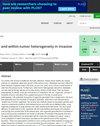Ten simple rules for leading a successful undergraduate-intensive research lab
IF 3.6
2区 生物学
引用次数: 0
Abstract
Participating in mentored research is an enormous benefit to undergraduate students. These immersive experiences can dramatically improve retention and completion rates, especially for students from traditionally underserved populations in STEM disciplines. Scientists typically do not receive any formal training in management or group dynamics before taking on the role of a lab head. Thus, peer forums and shared wisdom are crucial for developing the vision and skills involved with mentorship and leading a successful research lab. Faculty at any institution can help improve student outcomes and the success of their labs by thoughtfully including undergraduates in their research programs. Moreover, faculty at primarily undergraduate institutions have special challenges that are not often acknowledged or addressed in public discussions about best practices for running a lab. Here, we present 10 simple rules for fostering a successful undergraduate research lab. While much of the advice herein is applicable to mentoring undergraduates in any setting, it is especially tailored to the special circumstances found at primarily undergraduate institutions.成功领导本科生密集型研究实验室的十条简单规则
参与指导研究对本科生大有裨益。这些身临其境的经历可以极大地提高学生的保留率和毕业率,尤其是对于来自传统上得不到充分服务的 STEM 学科人群的学生而言。科学家在担任实验室负责人之前,通常不会接受任何有关管理或团体动力的正规培训。因此,同行论坛和分享智慧对于培养导师的远见和技能以及领导一个成功的研究实验室至关重要。任何院校的教师都可以通过深思熟虑地将本科生纳入研究计划,帮助提高学生的学习成绩和实验室的成功率。此外,以本科生为主的院校的教师还面临着一些特殊的挑战,而这些挑战在有关实验室管理最佳实践的公开讨论中并不常见。在此,我们提出了培养一个成功的本科生研究实验室的 10 条简单规则。虽然这里的大部分建议都适用于指导任何环境下的本科生,但特别适合以本科生为主的院校的特殊情况。
本文章由计算机程序翻译,如有差异,请以英文原文为准。
求助全文
约1分钟内获得全文
求助全文
来源期刊

PLoS Computational Biology
生物-生化研究方法
CiteScore
7.10
自引率
4.70%
发文量
820
期刊介绍:
PLOS Computational Biology features works of exceptional significance that further our understanding of living systems at all scales—from molecules and cells, to patient populations and ecosystems—through the application of computational methods. Readers include life and computational scientists, who can take the important findings presented here to the next level of discovery.
Research articles must be declared as belonging to a relevant section. More information about the sections can be found in the submission guidelines.
Research articles should model aspects of biological systems, demonstrate both methodological and scientific novelty, and provide profound new biological insights.
Generally, reliability and significance of biological discovery through computation should be validated and enriched by experimental studies. Inclusion of experimental validation is not required for publication, but should be referenced where possible. Inclusion of experimental validation of a modest biological discovery through computation does not render a manuscript suitable for PLOS Computational Biology.
Research articles specifically designated as Methods papers should describe outstanding methods of exceptional importance that have been shown, or have the promise to provide new biological insights. The method must already be widely adopted, or have the promise of wide adoption by a broad community of users. Enhancements to existing published methods will only be considered if those enhancements bring exceptional new capabilities.
 求助内容:
求助内容: 应助结果提醒方式:
应助结果提醒方式:


